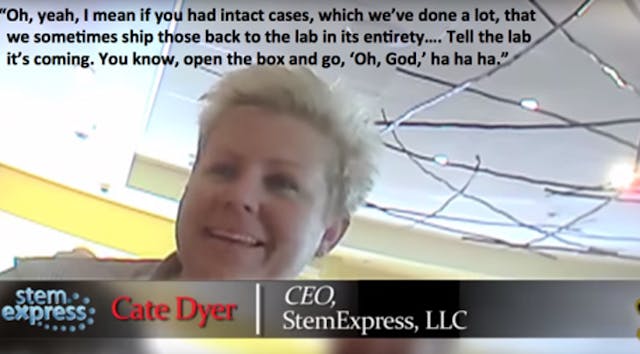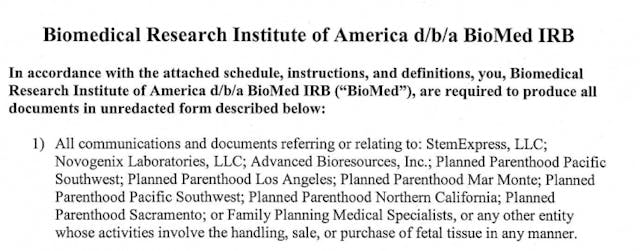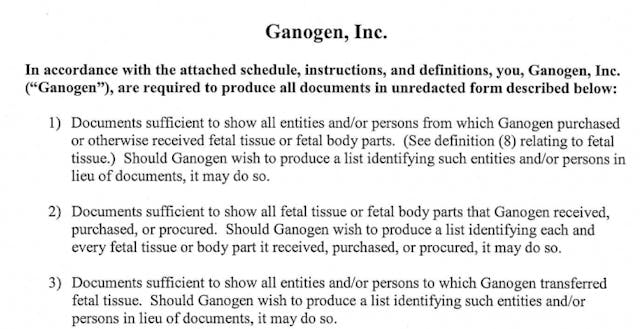
A growing number of Americans call themselves ‘pro-choice’ – but what’s really behind it?
Nancy Flanders
·
Analysis·By Catherine Livingston, PhD
Congressional panel issues subpoenas to fetal research organizations
The subpoenas are being moved almost as quickly as the baby parts after an abortion. The House Select Investigative Panel on Infant Lives has announced the issuance of 12 new subpoenas in its ongoing investigation on the harvesting of fetal body parts, following the release of multiple undercover videos last year from the Center for Medical Progress.
The House Energy and Commerce Committee had previously requested the information, but says these subpoenas were sent “to organizations who have failed to fully cooperate with both requests for information and previous subpoenas.” A press release notes that groups have been uncooperative with the panel.
“To date the Majority Staff of the Select Investigative Panel has sent more than 40 letters requesting documents. Those letters all asked for information to be provided voluntarily.”
Committee Chairman Marsha Blackburn made the following statement with regards to the ongoing investigation:
There should be no resistance to letting all the facts come out — but some abortion supporters seem to be clearly rattled with basic facts coming to light… Therefore, in the interest of completing our investigation pursuant to H. Res. 461, we will continue to issue subpoenas when necessary to ensure information can be gathered in a timely fashion.
The subpoenas were handed to various biomedical organizations. One of them, Biomedical Research Institute of America, is a private institutional review board (IRB) which promises fast turnaround for research study approval so researchers can get their work with fetal parts approved without going through the stricter IRB route.
The Food and Drug Administration allows independent IRBs so Planned Parenthood and other groups can get their studies approved–studies that might otherwise not have been approved had they gone through an institutional IRB, such as a university or hospital.
Thus, Biomedical Research Institute of America will take the money of fetal researchers and then quickly approve studies. The organization advertises a one week turnaround (IRBs can take several months under traditional channels).
This was a focus of discussion in the last hearing this panel held, as Live Action News reported on Lawrence Goldstein, a researcher who insists on the need for using baby brains for research:
Article continues below
Dear Reader,
Have you ever wanted to share the miracle of human development with little ones? Live Action is proud to present the "Baby Olivia" board book, which presents the content of Live Action's "Baby Olivia" fetal development video in a fun, new format. It's perfect for helping little minds understand the complex and beautiful process of human development in the womb.
Receive our brand new Baby Olivia board book when you give a one-time gift of $30 or more (or begin a new monthly gift of $15 or more).
Goldstein was adamant that fetal tissue research must continue or research would “slow down,” potentially delaying a cure for a disease.
But Rep. Andy Harris (R- MD) noted that the process has already been slowed down because of the necessary IRB process. Researchers who use human subjects are not only subject to the aforementioned Belmont Report for ethics in research, but they must also submit their studies to an institutional review board, or IRB, before being allowed to proceed with their research. Harris pointed out that the IRB process can take six months, or even longer. Thus, he argued, the process is already slow, but this is necessary because it allows patients their protection – which is more important than speed. No research study that involves humans can proceed without IRB approval.

Now BioMed IRB will submit its communications with Stem Express, Planned Parenthood, and others:

Also on the subpoena list is StemExpress itself – the California for-profit organization now infamous for its fetal parts deals with Planned Parenthood. One of the two subpoenas for StemExpress requests all of the company’s documents related to Biomedical Research Institute of America and its IRB, indicating that the House Select Panel is likely investigating the ethical implications of the independent IRB process. As previously reported by Live Action News:
This was one of the controversies with the Planned Parenthood videos, as PP executives Dr. Deborah Nucatola and Mary Gatter both complained about the slow IRB process, and Nucatola commented on ways Planned Parenthood gets around needing an IRB.
Ganogen, Inc. was also included in this round of subpoenas. Ganogen is another fetal research company which made headlines when it announced it had transplanted the kidney of an aborted baby into a rat. Now the House Select Panel has questions about Ganogen’s fetal parts dealings:

Also included in these subpoenas are four with redacted names. These remaining subpoenas all request information either related to StemExpress, or to the University of New Mexico and Southwestern Women’s Options, the late-term abortion facility run by late-term abortionist Curtis Boyd.
The University of New Mexico is under fire this week for keeping Boyd under a faculty contract and paying his malpractice insurance, which is subsidized by New Mexico taxpayers. Boyd is also not credentialed as an OB/GYN or even as a family practice physician, and is therefore unqualified to train the students he instructs at UNM. Now the House Select Panel wants to know what is taking place behind the scenes at the university and at Boyd’s late-term abortion facility.

While the recipients of the subpoenas have yet to respond, these subpoenas reveal a story of the behind-the-scenes fetal parts industry the nation was exposed to in the Center for Medical Progress’s Planned Parenthood videos.
Each of the subpoenas request information from Jan. 1, 2011, until the present, and each has an April 11th deadline for delivery of documents.
Live Action News is pro-life news and commentary from a pro-life perspective.
Contact editor@liveaction.org for questions, corrections, or if you are seeking permission to reprint any Live Action News content.
Guest Articles: To submit a guest article to Live Action News, email editor@liveaction.org with an attached Word document of 800-1000 words. Please also attach any photos relevant to your submission if applicable. If your submission is accepted for publication, you will be notified within three weeks. Guest articles are not compensated (see our Open License Agreement). Thank you for your interest in Live Action News!

Nancy Flanders
·
Analysis
Angeline Tan
·
Analysis
Cassy Cooke
·
Politics
Madison Evans
·
Opinion
Nancy Flanders
·
Investigative
Carole Novielli
·
Human Interest
Catherine Livingston, PhD
·
International
Catherine Livingston, PhD
·
Newsbreak
Catherine Livingston, PhD
·
Human Interest
Catherine Livingston, PhD
·
Human Interest
Catherine Livingston, PhD
·